
Doctors should consider Netherton syndrome in patients with chronic skin and hair issues to avoid misdiagnosis.
 March 2024 in “Clinical and experimental dermatology”
March 2024 in “Clinical and experimental dermatology” Topical corticosteroids may be a safe and effective treatment for severe alopecia areata in children.
 January 2024 in “Dermatology practical & conceptual”
January 2024 in “Dermatology practical & conceptual” Atopic dermatitis in kids with alopecia areata can predict poor response to topical immunotherapy.
 December 2023 in “Research Square (Research Square)”
December 2023 in “Research Square (Research Square)” These specific gene polymorphisms are not linked to Alopecia Areata in Egyptians.
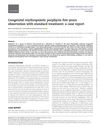 December 2023 in “Oxford medical case reports”
December 2023 in “Oxford medical case reports” Standard treatment for congenital erythropoietic porphyria was ineffective over five years.
 November 2023 in “Scholars academic journal of biosciences”
November 2023 in “Scholars academic journal of biosciences” Trichotillomania can cause severe complications like hairballs in the stomach, needing surgery and psychiatric care.
 October 2023 in “Paediatrics & child health”
October 2023 in “Paediatrics & child health” The document advises health care providers on how to support transgender and gender-diverse youth with appropriate care and referrals.
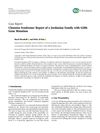 October 2023 in “Case reports in dermatological medicine”
October 2023 in “Case reports in dermatological medicine” A Jordanian family with Clouston syndrome has a common GJB6 gene mutation.
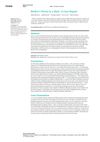 September 2023 in “Curēus”
September 2023 in “Curēus” A 21-year-old male has a benign skin condition called Becker's nevus, which he chose not to treat.
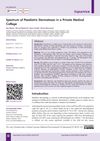 September 2023 in “Journal of Nepal Paediatric Society”
September 2023 in “Journal of Nepal Paediatric Society” Skin infections and rashes are the most common skin problems in children.
 June 2023 in “GSC Advanced Research and Reviews”
June 2023 in “GSC Advanced Research and Reviews” Hutchinson-Gilford Progeria Syndrome causes rapid aging from a genetic mutation, with no cure but ongoing research into potential treatments.
 June 2023 in “Buletin de psihiatrie integrativă”
June 2023 in “Buletin de psihiatrie integrativă” Alopecia causes significant emotional distress and psychological issues, requiring combined skin and mental health treatment.
 February 2023 in “Research Square (Research Square)”
February 2023 in “Research Square (Research Square)” Blocking IL-17 can reduce skin inflammation in a mouse model of pityriasis rubra pilaris.
 December 2022 in “Rossijskij žurnal kožnyh i veneričeskih boleznej”
December 2022 in “Rossijskij žurnal kožnyh i veneričeskih boleznej” New treatments for child hair loss due to immune issues are effective but not yet officially approved.
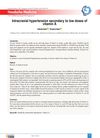 October 2022 in “Deleted Journal”
October 2022 in “Deleted Journal” Long-term low-dose Vitamin A intake may cause increased brain pressure.
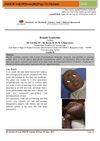 June 2022 in “Journal of medical science and clinical research”
June 2022 in “Journal of medical science and clinical research” Brandt syndrome, with symptoms like skin rash, hair loss, and diarrhea, improves quickly with zinc supplements.
 March 2022 in “Research Square (Research Square)”
March 2022 in “Research Square (Research Square)” A girl with severe hair loss saw hair regrowth after using cannabis.
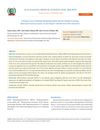 October 2021 in “Acta Scientific Medical Sciences”
October 2021 in “Acta Scientific Medical Sciences” A woman was diagnosed with a rare adrenal gland cancer that did not show usual hormone-related symptoms.
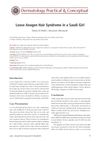 October 2021 in “Dermatology practical & conceptual”
October 2021 in “Dermatology practical & conceptual” A Saudi girl was diagnosed with Loose Anagen Hair Syndrome, a rare condition causing easy hair loss without scarring.

TCA injections are more effective and safer than cryotherapy for treating alopecia areata.
 January 2021 in “International journal of medical science and health research”
January 2021 in “International journal of medical science and health research” A patient with sickle cell trait and low vitamin D might have lupus, a rare combination that needs more attention.
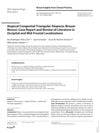 January 2021 in “Skin appendage disorders”
January 2021 in “Skin appendage disorders” The report concludes that atypical Brauer nevus is more common in males, present at birth, and often misdiagnosed due to its unusual scalp locations.
 January 2021 in “Pediatric Oncall”
January 2021 in “Pediatric Oncall” Autoimmune hepatitis in children often affects girls and can be treated successfully with medication.
 December 2020 in “Current Sexual Health Reports”
December 2020 in “Current Sexual Health Reports” Finasteride can have lasting negative effects on brain function and behavior by disrupting neurosteroid production.
 October 2020 in “International journal of Ayurvedic medicine”
October 2020 in “International journal of Ayurvedic medicine” Leech therapy and Ayurvedic treatment can effectively regrow hair in recent Alopecia areata cases.

The document describes a rare case of IFAP syndrome, a genetic condition with symptoms of hair loss, light sensitivity, and scaly skin.
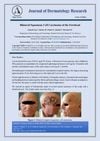
A 70-year-old man with skin cancer on both sides of his forehead was treated with surgery and cryotherapy, highlighting the need for early detection and prevention.

The robotic system for hair restoration surgery works well, giving similar results to manual techniques after 9 months.
 January 2019 in “ARC journal of pharmaceutical sciences”
January 2019 in “ARC journal of pharmaceutical sciences” Acne can be managed with various treatments and requires psychological support due to its emotional impact.
 January 2019 in “Clinical neuropharmacology”
January 2019 in “Clinical neuropharmacology” A girl's hair-pulling condition improved greatly after she started vitamin D treatment.






























